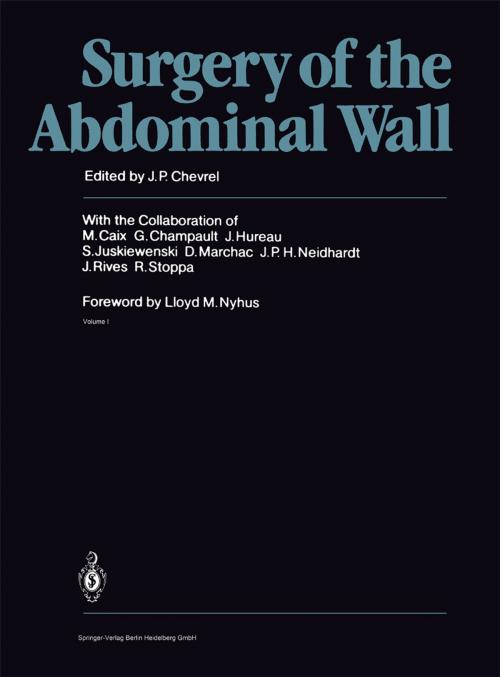| Author: | Lloyd M. Nyhus, M. Caix, G. Champault, J. Hureau, S. Juskiewenski, D. Marchac, J.P.H. Neidhardt, J. Rives, R. Stoppa | ISBN: | 9783662101643 |
| Publisher: | Springer Berlin Heidelberg | Publication: | March 9, 2013 |
| Imprint: | Springer | Language: | English |
| Author: | Lloyd M. Nyhus, M. Caix, G. Champault, J. Hureau, S. Juskiewenski, D. Marchac, J.P.H. Neidhardt, J. Rives, R. Stoppa |
| ISBN: | 9783662101643 |
| Publisher: | Springer Berlin Heidelberg |
| Publication: | March 9, 2013 |
| Imprint: | Springer |
| Language: | English |
The abdominal wall has always been of interest to surgeon-anato mists. It was recognized as a barrier, and volumes have been written demonstrating how to breach this wall. Similarly, great importance has been placed on the methods of repairing the abdominal wall, whether that repair is necessitated by a primary operative wound, a congenital failure, an acquired defect, or the ubiquitous iatrogenic problem, the postoperative abdominal wall hernia. French surgeons have a long tradition of excellence in the field of human anatomy: the names of Pare, Bichat, Cloquet, and Fru chaud readily come to mind. It is not surprising then, that this com prehensive text on the subject of the abdominal wall and its defects emanates from France. Although there are many interesting aspects to this presentation of abdominal wall problems, I find the review of prosthetic material and its use to be most unique. The synthetic meshes available today may well revolutionize our various approaches for repair of hernial defects. Considerable experience has evolved in the use of these prosthetic materials, particularly in the United Kingdom and Eu rope. I have been a proponent of prosthetic mesh for the cure of recurrent groin hernia during the past decade. According to the re sults reported in this book, the use of a prosthetic material in select ed patients needing primary hernia repair seems indicated. I would be remiss if the organization GREPA were not highlighted.
The abdominal wall has always been of interest to surgeon-anato mists. It was recognized as a barrier, and volumes have been written demonstrating how to breach this wall. Similarly, great importance has been placed on the methods of repairing the abdominal wall, whether that repair is necessitated by a primary operative wound, a congenital failure, an acquired defect, or the ubiquitous iatrogenic problem, the postoperative abdominal wall hernia. French surgeons have a long tradition of excellence in the field of human anatomy: the names of Pare, Bichat, Cloquet, and Fru chaud readily come to mind. It is not surprising then, that this com prehensive text on the subject of the abdominal wall and its defects emanates from France. Although there are many interesting aspects to this presentation of abdominal wall problems, I find the review of prosthetic material and its use to be most unique. The synthetic meshes available today may well revolutionize our various approaches for repair of hernial defects. Considerable experience has evolved in the use of these prosthetic materials, particularly in the United Kingdom and Eu rope. I have been a proponent of prosthetic mesh for the cure of recurrent groin hernia during the past decade. According to the re sults reported in this book, the use of a prosthetic material in select ed patients needing primary hernia repair seems indicated. I would be remiss if the organization GREPA were not highlighted.















